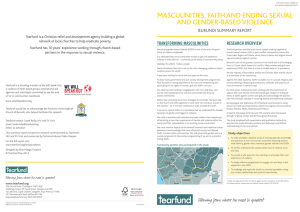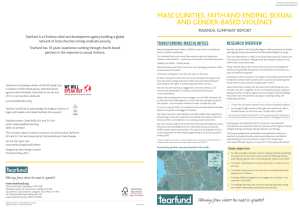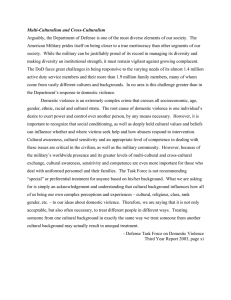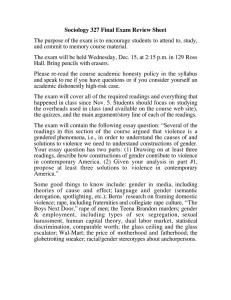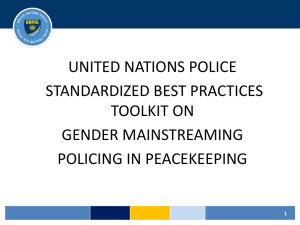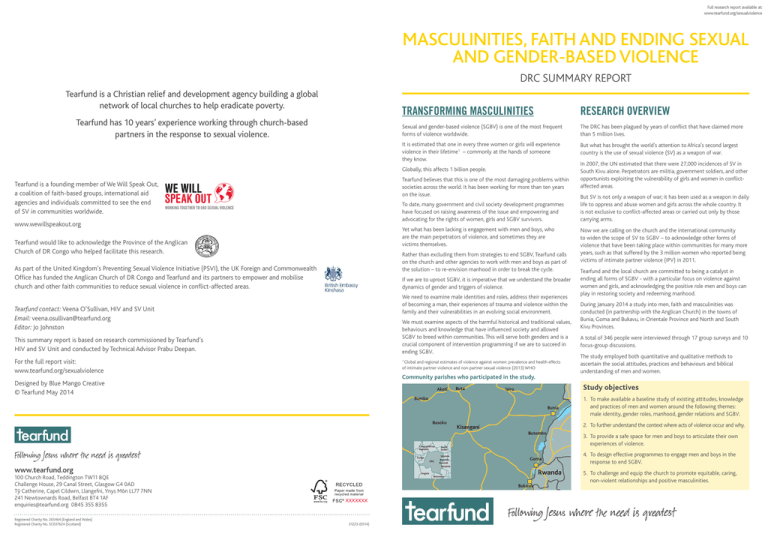
Full research report available at:
www.tearfund.org/sexualviolence
MASCULINITIES, FAITH AND ENDING SEXUAL
AND GENDER-BASED VIOLENCE
DRC SUMMARY REPORT
Tearfund is a Christian relief and development agency building a global
network of local churches to help eradicate poverty.
Tearfund has 10 years’ experience working through church-based
partners in the response to sexual violence.
TRANSFORMING MASCULINITIES
RESEARCH OVERVIEW
Sexual and gender-based violence (SGBV) is one of the most frequent
forms of violence worldwide.
The DRC has been plagued by years of conflict that have claimed more
than 5 million lives.
It is estimated that one in every three women or girls will experience
violence in their lifetime1 – commonly at the hands of someone
they know.
But what has brought the world’s attention to Africa’s second largest
country is the use of sexual violence (SV) as a weapon of war.
Globally, this affects 1 billion people.
Tearfund believes that this is one of the most damaging problems within
societies across the world. It has been working for more than ten years
on the issue.
Tearfund is a founding member of We Will Speak Out,
a coalition of faith-based groups, international aid
agencies and individuals committed to see the end
of SV in communities worldwide.
To date, many government and civil society development programmes
have focused on raising awareness of the issue and empowering and
advocating for the rights of women, girls and SGBV survivors.
www.wewillspeakout.org
Yet what has been lacking is engagement with men and boys, who
are the main perpetrators of violence, and sometimes they are
victims themselves.
Tearfund would like to acknowledge the Province of the Anglican
Church of DR Congo who helped facilitate this research.
Rather than excluding them from strategies to end SGBV, Tearfund calls
on the church and other agencies to work with men and boys as part of
the solution – to re-envision manhood in order to break the cycle.
As part of the United Kingdom’s Preventing Sexual Violence Initiative (PSVI), the UK Foreign and Commonwealth
Office has funded the Anglican Church of DR Congo and Tearfund and its partners to empower and mobilise
church and other faith communities to reduce sexual violence in conflict-affected areas.
If we are to uproot SGBV, it is imperative that we understand the broader
dynamics of gender and triggers of violence.
We need to examine male identities and roles, address their experiences
of becoming a man, their experiences of trauma and violence within the
family and their vulnerabilities in an evolving social environment.
Tearfund contact: Veena O’Sullivan, HIV and SV Unit
Email: veena.osullivan@tearfund.org
Editor: Jo Johnston
We must examine aspects of the harmful historical and traditional values,
behaviours and knowledge that have influenced society and allowed
SGBV to breed within communities. This will serve both genders and is a
crucial component of intervention programming if we are to succeed in
ending SGBV.
This summary report is based on research commissioned by Tearfund’s
HIV and SV Unit and conducted by Technical Advisor Prabu Deepan.
For the full report visit:
www.tearfund.org/sexualviolence
Global and regional estimates of violence against women: prevalence and health effects
of intimate partner violence and non-partner sexual violence (2013) WHO
1
Community parishes who participated in the study.
Designed by Blue Mango Creative
© Tearfund May 2014
Aketi
Buta
Bunia
Following Jesus where the need is greatest
Congo
DRC
www.tearfund.org
100 Church Road, Teddington TW11 8QE
Challenge House, 29 Canal Street, Glasgow G4 0AD
Tŷ Catherine, Capel Cildwrn, Llangefni, Ynys Môn LL77 7NN
241 Newtownards Road, Belfast BT4 1AF
enquiries@tearfund.org 0845 355 8355
Registered Charity No. 265464 (England and Wales)
Registered Charity No. SC037624 (Scotland)
South
Sudan
Uganda
Rwanda
Burundi
Tanzania
Goma
Rwanda
Angola
Botswana
Bukavu
XXXXXXX
31223-(0514)
Now we are calling on the church and the international community
to widen the scope of SV to SGBV – to acknowledge other forms of
violence that have been taking place within communities for many more
years, such as that suffered by the 3 million women who reported being
victims of intimate partner violence (IPV) in 2011.
Tearfund and the local church are committed to being a catalyst in
ending all forms of SGBV - with a particular focus on violence against
women and girls, and acknowledging the positive role men and boys can
play in restoring society and redeeming manhood.
During January 2014 a study into men, faith and masculinities was
conducted (in partnership with the Anglican Church) in the towns of
Bunia, Goma and Bukavu, in Orientale Province and North and South
Kivu Provinces.
A total of 346 people were interviewed through 17 group surveys and 10
focus-group discussions.
The study employed both quantitative and qualitative methods to
ascertain the social attitudes, practices and behaviours and biblical
understanding of men and women.
1.To make available a baseline study of existing attitudes, knowledge
and practices of men and women around the following themes:
male identity, gender roles, manhood, gender relations and SGBV.
2.To further understand the context where acts of violence occur and why.
Kisangani
Butembo
Central Africa
Republic
But SV is not only a weapon of war; it has been used as a weapon in daily
life to oppress and abuse women and girls across the whole country. It
is not exclusive to conflict-affected areas or carried out only by those
carrying arms.
Study objectives
Isiro
Bumba
Basoko
In 2007, the UN estimated that there were 27,000 incidences of SV in
South Kivu alone. Perpetrators are militia, government soldiers, and other
opportunists exploiting the vulnerability of girls and women in conflictaffected areas.
3.To provide a safe space for men and boys to articulate their own
experiences of violence.
4.To design effective programmes to engage men and boys in the
response to end SGBV.
5.To challenge and equip the church to promote equitable, caring,
non-violent relationships and positive masculinities.
Burundi
Following Jesus where the need is greatest
SUMMARY OF KEY FINDINGS
The conflict in the DRC has exacerbated the deeply-rooted gender
inequality that was already present.
Research results show that the roles and identities of men and women
are tightly defined: women are seen as inferior to men, treated as a
possession; men are expected to provide, and demonstrate violence and
toughness. Many thought God ordained it this way.
However, compared to other countries where this research has been
carried out, respondents were more willing to express their opinions and
hopes, and articulated a strong desire to change.
Here are the key research findings.
“Our culture prevents women from progressing. We see in other
cultures that women are doing other work, and this is helping the
development of their communities. We need the same in our country.”
Gendered roles and attitudes
1.More than two thirds of men and women agreed that a man needs to
provide for the family and extended family, in order to be viewed as a
proper man.
There are times when a woman deserves to be beaten
Gender relations and decision making
3.More than half of women and men thought that a woman cannot
refuse to have sex with her husband. “Because it is the right of the
husband, the woman doesn’t have the right over her body.”
4.81 per cent of men and 86 per cent of women disagreed that it was a
woman’s responsibility to avoid getting pregnant.
Agreed
•The church in DRC has to be unified in denouncing SGBV, and work
together with other faith groups to engage men and boys to end
SGBV. The church needs to take the leadership in breaking the silence
on IPV, especially the issue of marital rape.
Disagreed
A woman needs to tolerate violence in order to keep the family together
5.Men are the gatekeepers of women’s health; 90 per cent of men and
87 per cent of women said it is the men who have the final say in
health-related matters.
Male responses
Female responses
6.In reality women did all of the household chores, but survey results
showed that a large majority of men thought they should share this
work (66 per cent of men and 69 per cent of women).
Agreed
Disagreed
KEY RECOMMENDATIONS
3. “My husband needs to be tough, if not I will not respect him.”
4.Men were threatened by women’s increasing role as breadwinner.
Their frustrations and feelings of neglect in the home were manifested
in violence to demonstrate power and reassert control.
It is clear that SV in the DRC is not just a feature of war or an
outcome of the conflict. It is embedded in everyday thinking and
tolerated as the norm.
Agreed
Disagreed
I think that a man should have the final say in all family matters
6.Almost half of men and women thought a woman’s most important
role was to cook and take care of her family. “If she doesn’t know to
cook she is not important in society.”
Male responses
Female responses
To be a man means providing for your family and your
extended family
The conflict has forced many people to adapt their roles, but this has also
led to increased violence in the home, behind closed doors.
However, positively, men and women also expressed progressive thinking
and desired a better future.
For a full list of recommendations for the way forward, please see
Chapter Six of the research report.
“The problem of rape is not with the victim, but the mentality of
the men.”
Male responses
Female responses
Agreed
Disagreed
Safe spaces
•We need to create safe spaces for men to discuss the concept of
positive masculinities, and facilitate discussions for them to share
their frustrations, challenges and traumatic experiences with peers
and church leaders. This is crucial to help them adapt to the changes
around them and heal from past experiences.
Partnerships
I think that a woman should obey her husband
Male responses
Female responses
•Church leaders need to promote and live out Christlike characteristics,
and act as positive role models - demonstrating humility and
reflecting how Christ interacted with women and subverted the social
norms of the day.
•Leaders should be trained as champions to engage men and boys in
the prevention of SGBV and promote positive masculinities, which are
non-violent and promote equity.
2.Male dominance in decision making was attributed to male
superiority, believed to be created by God – the majority justified this
in discussions.
2.In the survey a large percentage of men and women did not think that
being manly equated with being tough, yet almost a third thought it
did and emphasised this in the focus group discussions (FGD).
5.59 per cent of men and 81 per cent of women were of the view that
it is a mother’s responsibility to care for the children.
Male responses
Female responses
1.Unanimously, 100 per cent of men and women agreed that a woman
should obey her husband.
Leadership and role models
An unemployed man from Bukavu said this about the rejection of
survivors: “If my wife is raped, I will accept her because I love her. If I
reject her, she may die.”
•The scope of work on rape in the DRC has to expand to address the
broader context of SGBV. Faith based organisations (FBOs) and nonFBOs need to find common ground and draw from each others’ work
and areas of expertise.
•Others need to acknowledge that the church and FBOs have
great potential to end SGBV, due to their historic influence within
communities.
•The generalisation that religion has perpetuated harmful practices
around gender needs to be stopped. It must be understood that this
has arisen from a misinterpretation of scriptures and misleading
teachings by some people in positions of power.
Policy and practices
•The international community should prioritise focusing on building
the capacity of government to respond to SGBV across the whole
country – not solely conflict-affected areas.
•It is imperative that judicial systems are scrutinised and strengthened
in order to hold perpetrators accountable and end the culture of
impunity; this includes providing a protection scheme for survivors
that enables them to access justice without fear, intimidation or
alienation from their communities.
Violence, manhood and SGBV
1.It was expected that a woman would tolerate violence for the sake of the
family (60 per cent of men and 67 per cent of women believed this).
2.69 per cent of men and 49 per cent of women did not think that it
was manly to defend the honour of the family, even by violent means.
Disagreed
Agreed
To be a man, you need to be tough
3.It was debated in the FGDs that violence should not be used in
general life, yet there was an unspoken understanding that it was
acceptable within the home.
Male responses
Female responses
4.Almost half of men thought that there were times when a woman
deserves to be beaten.
5.82 per cent of both men and women thought that some women
asked to be raped by the way they dressed and behaved.
6.It was clear a woman’s body was not viewed as her own, with more
than half of men and women agreeing that a woman cannot refuse to
have sex with her husband.
Agreed
Disagreed
7.Men felt entitled to dominate women and believed woman was
created for man, as his helper and subordinate.
Awareness and education
•It is crucial to raise awareness of existing laws and policies in relation
to SGBV. The church can be a catalyst in reaching all parts of the DRC
and publicly denounce all forms of SGBV against women and girls
using correct biblical teachings and discussion.
•The church must openly denounce marital rape as a sin and not in line
with the Christian faith.
•There needs to be sound theologically-based education as well as
repeated training for lay leaders, pastors and bishops in order to set
right biblical misinterpretations.
•Churches should offer pre- and post-marriage counselling, which includes
teaching on IPV, marital rape and aspects of equitable relationships.
A group of men who participated in the study. Photo: Prabu Deepan/Tearfund.
“Rape is like guns in our country, it’s killing our women.”
Tearfund believes that the church should always be a place where social
norms and attitudes can be challenged if they are causing harm
“Rape at home is the most common form of rape, but victims hardly
speak out in order to protect the dignity of the family.”
The Bible teaches that all humans should be treated with love and
respect and that men and women are created equal in the eyes of God

